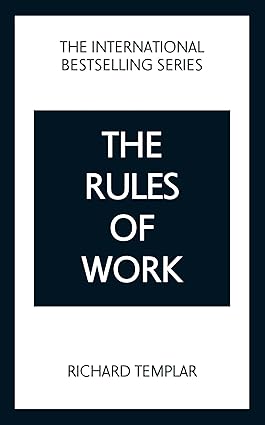The Rules of Work by Richard Templar
Summary
Richard Templar provides the aspiring office worker with a practical guide to succeeding in the workplace. Refreshingly, he avoids promoting skulduggery, office politics, or underhanded tactics. For Templar, success comes from being the best at your job and behaving like someone who belongs at the top. He aims to offer the advice and insight a career-minded professional needs to rise through the ranks with integrity and confidence.

Key Insights
Everything you do in the office is being judged. Everything. There are no “down moments,” and nothing is off the record. It starts with the way you walk across the office or sit at your desk. The clothes you wear, the expression on your face—and you haven’t even begun any actual work yet.
Your superiors, your peers, your subordinates: all of them are evaluating you, all the time. One careless word, one thoughtless gesture, may be enough to damage—perhaps irretrievably—your professional reputation.
This is Templar’s core idea, and on this point, he is absolutely right.
Physical impressions count. Start by getting the basics right: dress smartly and stylishly. It’s important to fit in, but that can still be done with elegance and panache. Let there be something distinctive—something intentional—about your appearance.
Look sharp. Sit upright. Walk with confidence. Avoid hand-wringing or hanging your head passively. Don’t slouch or fold in on yourself. Make eye contact. Offer a firm handshake. And smile. Confidence is attractive. Speak clearly, don’t mumble, and always finish your sentences.
Cultivate a positive attitude. You have to want to be the best—and pursue it. Dedicate yourself to being the best you can be. Never whinge or moan; no one likes a whiner. Whatever you do, do it without complaining. If something’s wrong, raise it professionally, but always offer a solution.
Have a plan. Know what you want to achieve. Identify the skills you need and the steps required. Then build a plan to acquire those skills and take those steps deliberately, consistently, and without excuse.
Be explicit. Never rely on fate. Wishing is for wimps. Don’t wish; plan, execute, review.
Manners maketh man. Be polite. All you have to do is say “please” and “thank you”, yet it’s astonishing how often people forget even these basics.
Be cheerful. Never share a bad mood. Stay positive, and listen carefully to others. Take note of what they say; it shows that you care. Always treat others with respect and courtesy, no matter the provocation. There are no exceptions.
Cultivate character, not just image. Develop the virtues of wisdom, maturity, reliability, trustworthiness, diligence, self-motivation, and hard work. These are not poses to strike—they are qualities to be lived and earned.
Never lie or dissemble, not under any circumstances. One lie is enough to ruin a reputation permanently.
Don’t gossip. And when someone is criticised in their absence, speak up for them. It shows integrity and people notice.
Finally, adopt an abundance mentality. Share information; don’t hoard it. Be willing to show colleagues how to do things, even if it seems to put you at a disadvantage. Being a helpful, considerate colleague will always pay dividends in the long run.
Strengths
Templar’s book enjoyed widespread readership and critical appreciation when it was first published more than twenty years ago, and it has stood the test of time. Perhaps the only aspect that now feels slightly dated is the rise of home-working, which has reduced the frequency and immediacy of in-person office interactions.
Nevertheless, his advice remains both practical and relevant. If you want your career to progress, then devise a plan, act with integrity, and treat your colleagues as you’d want to be treated by them. It’s astonishingly simple and all the more powerful for it.
Weaknesses
There is some repetition in this book, with the same basic ideas resurfacing in slightly different forms across multiple chapters. However, the book is designed to be dipped into rather than read cover to cover, so this is forgivable. In fact, repetition can be a strength: sometimes the best way to make an idea stick is to hear it more than once. sometimes is best to have the same idea repeated several times and this helps it take root.
Reflections
There were parts of this book that made for a painful read. It’s not unknown for me to slouch, or to share a bad mood, or to complain. And there have certainly been times when my conduct in the office has fallen short. Templar holds up a mirror, and the truth is, I didn’t much like the image staring back at me.
As with many books in this genre, the real danger lies in fleeting inspiration: you read it once, you agree with it, you resolve to make all sorts of improvements, and then, a week later, it’s all been forgotten. You slip back into old habits, and the net gain is zero.
That outcome needs to be avoided.
Conclusion
More than twenty years on, Richard Templar’s The Rules of Work is still worth reading. That’s likely because its core message is as valid now as it was then, and indeed, as it was when first expressed over two thousand years ago: a man reaps what he sows.
If you work hard, strive for excellence, and treat those around you with respect and kindness, you will succeed, whatever path you pursue. But if you don’t sow, if you’re careless, thoughtless, or idle, then your harvest will be poor.
Book Details
Title: The Rules of Work
Author: Richard Templar
Publication Year: 2003
Genre: Management Skills, Leadership
Amazon